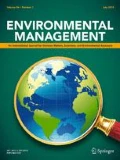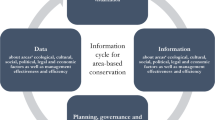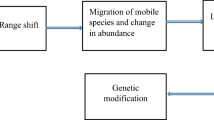Abstract
Local perceptions of environmental and climate change, as well as associated adaptations made by local populations, are fundamental for designing comprehensive and inclusive mitigation and adaptation plans both locally and nationally. In this paper, we analyze people’s perceptions of environmental and climate-related transformations in communities across the Western Solomon Islands through ethnographic and geospatial methods. Specifically, we documented people’s observed changes over the past decades across various environmental domains, and for each change, we asked respondents to identify the causes, timing, and people’s adaptive responses. We also incorporated this information into a geographical information system database to produce broad-scale base maps of local perceptions of environmental change. Results suggest that people detected changes that tended to be acute (e.g., water clarity, logging intensity, and agricultural diseases). We inferred from these results that most local observations of and adaptations to change were related to parts of environment/ecosystem that are most directly or indirectly related to harvesting strategies. On the other hand, people were less aware of slower insidious/chronic changes identified by scientific studies. For the Solomon Islands and similar contexts in the insular tropics, a broader anticipatory adaptation planning strategy to climate change should include a mix of local scientific studies and local observations of ongoing ecological changes.





Similar content being viewed by others
References
Abernethy, KE, Aswani, S, Albert, S, Hoddy, ET, Vaccaro, I, Beare, DJ (in press) Differential perceptions of environmental change among coastal communities of western Solomon Islands. Ecol Soc
Adger N (2003) Social Capital, Collective Action, and Adaptation to Climate Change. Econ Geo 79:387–404
Adger N, Arnell N, Thompkins E (2005) Adapting to climate change: perspectives across scales. Glob Environ Chan 15:75–76
Adger N et al (2008) Are there social limits to adaptation to climate change? Clim Chan 93:335–354
Adger WN, Dessai S, Goulden M, Hulme M, Lorenzoni I, Nelson DR, Naess LO, Wolf J, Wreford A (2009) Are there social limits to adaptation to climate change? Clim Cha 93:335–354
Adger N, Barnett J, Brown K, Marshall N, O’Brien K (2012) Cultural dimensions of climate change impacts and adaptation. Nat Clim Chan 112–117
Albert S, Aswani S, Fisher PL, Albert J (2015) Keeping food on the table: human responses and changing coastal fisheries in solomon islands. PLoS One
Alexander C et al (2011) Linking indigenous and scientific knowledge of climate change. Bioscience 61:477–484
Aswani S (2014) Investigating coral reef ethnobiology in the western Solomon Islands for enhancing livelihood resilience. Jour Polyn Soc 123:237–276
Aswani S, Lauer M (2014) Indigenous people’s detection of rapid ecological change. Cons Bio 28:820–828
Barnett J (2001) Adapting to climate change in Pacific Island countries: the problem of uncertainty. World Devel 29:977–993
Batterbury SPJ (2008) Anthropology and global warming: the need for environmental engagement. Austral Jour Anthro 19:62–68
Bell J, Kronen M, Vunisea, A, Nash, W, Keeble, G, Demmke, A, et al (2009) Planning the use of fish for food security in the Pacific. Mar Policy 33:64–76.
Berkes F, Jolly D (2001) Adapting to climate change: social-ecological resilience in a Canadian Western Arctic community. Cons Eco l 5:18
Clark N (2010) Volatile worlds, vulnerable bodies: confronting abrupt climate change. Theo Cult Soc 27:31–53
Couzin J (2007) Opening doors to native knowledge. Science 315:1518–1519
Crate S (2006) Elder knowledge and sustainable livelihoods in post-soviet Russia: finding dialogues across generations. Arctic Anthro 43:40–51
Crate S (2008) Gone the bull of winter? Grappling with the cultural implications of and anthropology’s role(s) in global climate change. Curr Anthro 49:569–595
Crate S, Nuttall M (eds) (2009) Anthropology and climate change: from encounters to actions. Left Coast Press, Walnut Cree
Cruikshank J (2005) Do glaciers listen? Local knowledge, colonial encounters, and social imagination. UBC Press, Vancouver
Deresa TT, Hassan RM, Ringler C, Alemu T, Yesuf M (2011) Perception of and Adaptation to Climate Change by Farmers in the Nile Basin of Ethiopia. Jour Agric Sci 149:23–31
Dolan AH, Walker IJ (2004) Understanding vulnerability of coastal communities to climate change-related risks. Jour Coast Res 39:1317–1324
Ford JD, Pearce T, Duerden F, Furgal CH, Smit B (2010) Climate change policy responses for Canada’s Inuit population: the importance of and opportunities for adaptation. Glob Environ Chan 20:177–191
Gelcich S et al (2010) Navigating transformations in governance of Chilean marine coastal resources. Proc Nat Acad Scie 107:16794–16799
Gero A, Meheux K, Dominey-Howes D (2011) Integrating community based disaster risk reduction and climate change adaptation: examples from the Pacific. Natural Hazards and Earth System Sciences 11:101–113
Grothmann T, Patt A (2005) Adaptive capacity and human cognition: the process of individual adaptation to climate change. Glob Environ Chan 15:199–213
Hastrup, K (2013) Anthropological contributions to the study of climate: past, present, future. WIREs Clim Change. doi: 10.1002/wcc.219
Hoeg-Guldberg O, Bruno J (2010) The impact of climate change on the world’s marine ecosystems. Science 328:1523–1528
Ingold T (1993) Globes and spheres. Routledge, London
Krupnik I, Jolly D (eds) (2002) The earth is faster now: Indigenous observations of Arctic environment change. Arctic Research Consortium of the United States, Fairbanks
Lazarus H (2012) Sea change: island communities and climate change. Ann Rev Anthro 41:285–301
Lazrus H (2009) Weathering the waves: climate change, politics, and vulnerability in Tuvalu. Ph.D. Dissertation, University of Washington
Leiserowitz A (2006) Climate change risk perception and policy preferences: the role of affect, imagery, and values. Clim Chan 77:45–72
Magistro J, Roncoli C (2001) Anthropological perspectives and policy implications of climate change research. Clim Res 19:91–96
Marin A, Berkes F (2013) Local people’s accounts of climate change: to what extent are they influenced by the media? Wiley Inter Rev Clim Chan 4:1–8
Marino E, Schweitzer P (2009) Talking and not talking about climate change in Northwestern Alaska. In: Crate S, Nuttall M (eds) Anthropology and climate change: from encounters to actions. Left Coast Press, Walnut Cree
Mawdsley J, Malley R, Ojima D (2009) A review of climate-change adaptation strategies for wildlife management and biodiversity conservation. Cons Bio 23:1080–1089
McAdoo BG, Moore A, Baumwoll J (2009) Indigenous knowledge and the near field population response during the 2007 Solomon Islands tsunami. Nat Haz 48:73–83
McClanahan TR, Cinner JE, Graham NA, Daw TM, Maina J, Stead SM, Wamukota A, Brown K, Venus V, Polunin N (2009) Identifying reefs of hope and hopeful actions: contextualizing environmental, ecological, and social parameters to respond effectively to climate change. Cons Bio 23:662–671
Mercer J, Kelman I, Taranis L, Suchet-Pearson S (2010) Framework for integrating indigenous and scientific knowledge for disaster risk reduction. Disasters 34:214–239
Mortreux C, Barnett J (2009) ‘Climate change, migration and adaptation in Funafuti, Tuvalu. Glob Envir Chan 19:105–112
National Population and Housing Census (2009) Statistics Office, Solomon Islands Government
Olds A, Connolly RM, Pitt KA, Maxwell PS, Aswani S, Albert S (2014) Incorporating seascape species and connectivity to improve marine conservation outcomes. Cons Bio. doi:10.1111/cobi.12242
Oliver-Smith A (2009) Sea level rise and the vulnerability of coastal peoples: responding to the local challenges of global climate change in the 21st century. Publication series UNU-EHS, Interdisciplinary Security Connections 7
Orlove B (2005) Human adaptation to climate change: a review of three historical cases and some general perspectives. Environ Sci Pol 8:589–600
Orlove B, Wiegandt E, Luckman B (eds) (2008) Darkening peaks: glacier retreat, science and society. University of California Press, Berkeley
Parks BC, Roberts JT (2006) A climate of injustice: global inequality, north-south politics, and climate policy. MIT Press, Cambridge
Parks BC, Roberts JT (2010) Climate change, social theory and justice. Theo Cult Soc 27:134–166
Pauly D (1995) Anecdotes and the shifting baseline syndrome of fisheries. Tren Ecol Evol 10:430
Reilly J, Schimmelpfennig D (2000) Irreversibility, uncertainty, and learning: portraits of adaptation to long-term climate change. Clim Chan 45:253–278
Roncoli C (2006) Ethnographic and participatory approaches to research on farmers’ responses to climate predictions. Clim Res 33:81–99
Roncoli C, Crane T, Orlove B (2009) Fielding climate change: the role of anthropology. In: Crate S, Nuttall M (eds) Anthropology and climate change: from encounters to actions. Left Coast Press, Walnut Cree
Sagarin R, Micheli F (2001) Climate change in nontraditional data sets. Science 294:811
Sherratt T, Griffiths T, Robin L (eds) (2003) A change in the weather: climate and culture in Australia. National Museum of Australia Press, Canberra
Strauss S, Orlove B (eds) (2003) Weather, climate, culture. Berg Publishers, New York
Swyngedouw E (2010) Apocalypse forever? Post-political populism and the specter of climate change. Theo Cult Soc 27:213–232
Szerszynski B, Urry J (2010) Changing climates: introduction. Theo Cult Soc 27:1–8
Van Putten I, Lalancette A, Bayliss P, Dennis D, Hutton T, Lopez A, Pascoe S, Plaganyi E, Skewes T (2013) A Bayesian model of factors influencing indigenous participation in the Torres Strait tropical rocklobster fishery. Mar Pol 37:96–105
Vedwan N, Rhoades RE (2001) Climate change in the Western Himalayas of India: a study of local perception and response. Clim Res 19:109–117
Wolf J, Moser SC (2011) Individual understandings, perceptions, and engagement with climate change: insights from in-depth studies across the world. Wiley Interdisciplinary Rev-Clim Chan 2:547–569
Ziervogel G et al (2006) Adapting to climate variability: pumpkins, people and policy. Nat Res For 30:294–305
Acknowledgments
The authors would like to extend their sincere acknowledgments to all those who engaged in the research activities as part of the project: The Pacific Adaptation Assistance Program in Solomon Islands—Building social and ecological resilience to climate change in Roviana, Solomon Islands, funded by the Department of Climate Change and Energy Efficiency by the Australian government. The production of the current manuscript was also supported by the CGIAR Research Programs on Climate Change, Agriculture and Food Security (CCAFS); and Aquatic Agricultural Systems (AAS). Thanks to the men and women from the communities in the Western Solomon Islands.
Author information
Authors and Affiliations
Corresponding author
Rights and permissions
About this article
Cite this article
Aswani, S., Vaccaro, I., Abernethy, K. et al. Can Perceptions of Environmental and Climate Change in Island Communities Assist in Adaptation Planning Locally?. Environmental Management 56, 1487–1501 (2015). https://doi.org/10.1007/s00267-015-0572-3
Received:
Accepted:
Published:
Issue Date:
DOI: https://doi.org/10.1007/s00267-015-0572-3




